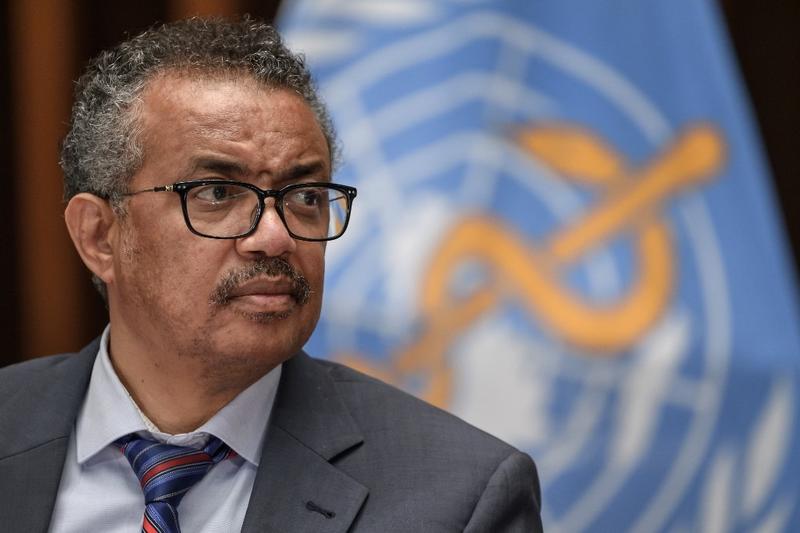 World Health Organization (WHO) Director-General Tedros Adhanom Ghebreyesus attends a press conference organised by the Geneva Association of United Nations Correspondents (ACANU) amid the COVID-19 outbreak, caused by the novel coronavirus, on July 3, 2020 at the WHO headquarters in Geneva. (FABRICE COFFRINI / POOL / AFP)
World Health Organization (WHO) Director-General Tedros Adhanom Ghebreyesus attends a press conference organised by the Geneva Association of United Nations Correspondents (ACANU) amid the COVID-19 outbreak, caused by the novel coronavirus, on July 3, 2020 at the WHO headquarters in Geneva. (FABRICE COFFRINI / POOL / AFP)
The World Health Organization on Monday called on governments and communities to maintain their vigilance against the coronavirus, with a plea for sustained action underscored by a doubling in the number of reported infections worldwide in just the past six weeks.
The WHO reported more than 16 million cases and over 650,000 deaths from COVID-19 around the world up to Tuesday
The WHO reported more than 16 million cases and over 650,000 deaths from COVID-19 around the world up to Tuesday. Thursday will mark six months since the global health agency declared the novel coronavirus a public health emergency of international concern-the highest level of alert under its system.
When the WHO declared the emergency on Jan 30, there were fewer than 100 cases outside China.
ALSO READ: WHO says COVID-19 pandemic is 'one big wave', not seasonal
WHO Director-General Tedros Adhanom Ghebreyesus said that he will reconvene the agency's emergency committee later this week for a reevaluation.
"COVID-19 has changed our world. It has brought people, communities and nations together, and driven them apart. It has shown what humans are capable of-both positively and negatively," he said in a virtual news conference in Geneva.
But he emphasized that the fundamental pillars of the response have not changed-political leadership, and informing, engaging and listening to communities.
He said populations must stick to the basic measures required to suppress transmission and save lives: find, isolate, test and care for cases; and trace and quarantine their contacts. He advised people to keep a distance from others, wash their hands, avoid crowded and enclosed areas, and wear a mask where recommended.
"Where these measures are followed, cases go down. Where they're not, cases go up," Tedros said.
He said countries and communities that have followed this advice have done well, either in preventing large-scale outbreaks or in bringing large outbreaks under control, citing New Zealand, Vietnam, China, Germany and Republic of Korea.
Tedros said that "one of the most fundamental ingredients for stopping this virus is determination, and the willingness to make hard choices to keep ourselves and each other safe".
Mike Ryan, executive director of the WHO's Health Emergencies Program, said what is clear is that countries that have implemented control measures have suppressed the virus.
"The question to ask is how much pressure you have on the virus," he said of those countries that are witnessing a new surge in COVID-19 cases.
Tightened measures
Maria Van Kerkhove, the WHO's COVID-19 technical lead, stressed that countries have the ability to turn things around because "we've seen it happen over and over and over again".
Their words come as several European countries tighten measures, after witnessing a resurgence in cases.
On Monday, Belgian Prime Minister Sophie Wilmes announced additional restrictions would be implemented to prevent a full-blown second wave, the Brussels Times reported.
"The situation is rapidly changing in our country. Apart from the infections, the number of hospital admissions and deaths remains under control for the time being, but we know that those figures will come with some delay," Wilmes said.
"We know that Belgium is not the only one in Europe where the virus is flaring up again, but that the countries around us are also experiencing a resurgence of the virus. Our aim is clear: avoid another full lockdown."
READ MORE: WHO chief: Global COVID-19 cases doubled over past 6 weeks
According to the announcement, from Wednesday and for at least the next four weeks, social bubbles are reduced to a maximum of five fixed people per household, children under 12 not included.
Stricter rules will be implemented for event gatherings. Wedding crowds will be limited to 10 people and shopping trips must be completed alone. A pass for the free use of trains, which the Belgian government promised its citizens, will be postponed until September.


